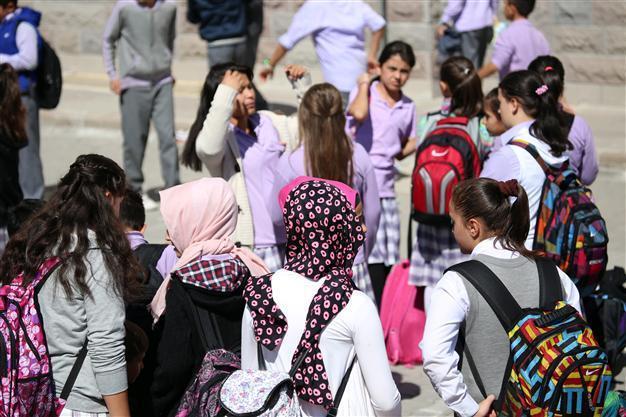Turkey’s bar associations file complaint for annulment of headscarf in schools
ANKARA

The debate over headscarves has again bubbled to the surface in Turkey. AA Photo
The Union of Turkish Bar Associations (TBB) filed a criminal complaint to the Council of State to annul the government’s decision to allow girls attending fifth-grade and upper school classes to wear headscarves.
A government decree changing the regulation on the dress code in public schools was published Sept. 27 in the Official Gazette, allowing girls as young as 10 to attend classes wearing headscarves.
In its complaint, the TBB argued that the right to education could conflict with the principle of secularism, and called for the annulment of the amendment in the regulation. It stressed that the recent regulation contradicts with Turkey’s civil code, recalling that its age of adulthood is set at 18.
“This amendment means the violation of secularism, which is a fundamental part of the Republic and is mentioned in the second article of the Constitution, which is confirmed to be not open to change in the fourth article of the Constitution,” the TBB complaint read.
Teachers’ union Eğitim-Sen also filed a lawsuit to the Council of State on Sept. 30 for the cancellation of the permission for the headscarf in schools.
On Oct. 1, another teachers union, the Union for Education and Science Workers (Eğitim-İş) also filed a criminal complaint against the amendment and demanded its annulment.
Ömer Faruk Eminağaoğlu, the president of the Judges and Prosecutors Union (YARSAV), filed a complaint to the Council of State for the annulment of the headscarf amendment on Oct. 1, as well as main opposition Republican People’s Party (CHP) deputy Dilek Akagün Yılmaz.
The amendment states that students “are to be present in schools with their faces visible; cannot use scarves, berets, hats, bags or similar materials that carry political symbols, pictures or writings; cannot dye hair, cannot have tattoos or make-up; cannot have piercings; cannot have a mustache or beard.”
It also stated that students in pre-school institutions and primary schools cannot wear headscarves.
Following the government’s move, Eğitim-Bir-Sen, an education sector trade union with conservative views, demanded the abolition of mixed-sex education, while also calling for freedom in the dress code as part of a reaction against the compulsory wearing of ties for men.
Until now, only female students enrolled in vocational Islamic schools (imam-hatip) were permitted to wear headscarves to class.
